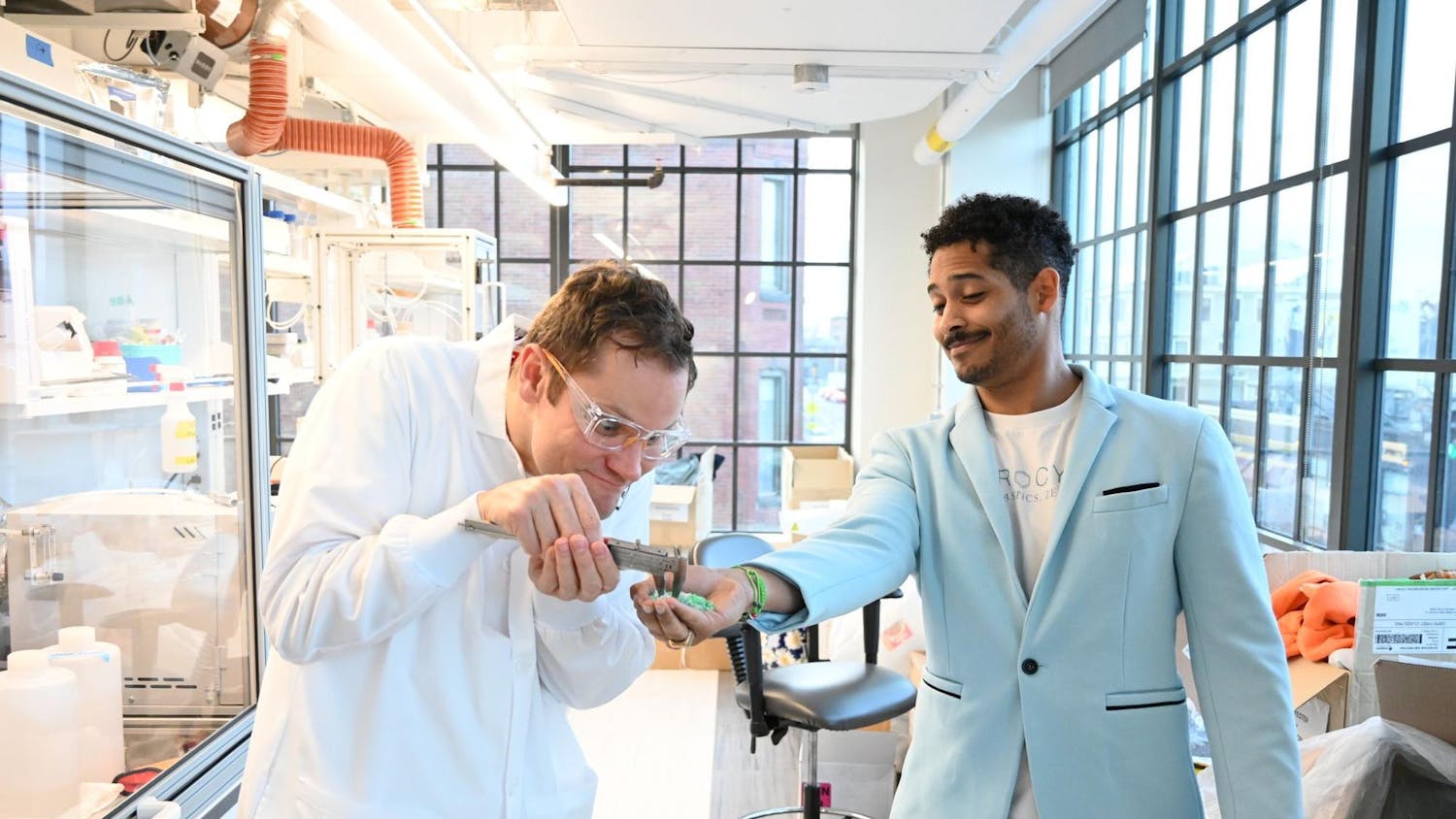Prof. Kyle Lancaster is a world renowned inorganic chemist whose impact on the field of science includes a Forbes 30 under 30 award and nearly 100 publications.
To many Cornell students, Lancaster is better known as the professor of the notorious CHEM 2070: General Chemistry I — a course known for its complicated material and specific grading.
The Sun sat down with Lancaster to learn more about CHEM 2070, his teaching style and how he manages a course that receives a lot of backlash.
Teaching and Tackling General Chemistry at Cornell
Lancaster likened his experience teaching CHEM 2070 at Cornell to being a dentist, describing it as “an important job that nobody thanks you for,” except for a “few people.”
Around 800 students take General Chemistry I in its more popular fall semester, many of whom are on the pre-medical track. It is a keystone course for any student on the pre-medical course that covers foundational concepts like molarity and solubility, to more complex topics such as electron orbitals and ligand field theory. Lancaster also teaches CHEM 4210: Introduction to Inorganic Chemistry Research and CHEM 6400: Bioinorganic Chemistry.

During the fall semester, CHEM 2070 met four times a week, with three 50 minute lectures and a 50 minute optional discussion section. Additionally, there was a weekly three hour lab section where students applied their practical understanding of chemistry to design and complete various experiments.
Lancaster described his teaching style as “jokes, live demos, practical knowledge and applicational knowledge.” His live demonstrations of chemistry are a unique component of the lecture, in which he and Professor Daniel Lorey perform chemistry experiments in front of the class.
“My first semester of chemistry [at college] we had no demos, and then in the second semester, my professor started with a really cool demo — the luminol demo I did for 2070,” Lancaster shared. He thinks that the live demonstrations help content “stick” with his students and break up the class time.
In one of his demonstrations, Lancaster mixed a cocktail while using the ingredients’ availability to describe the concept of limiting reagents — a chemistry concept describing an ingredient in a reaction that is the first to be used up.
“You have to use your imagination to think about mixing a cocktail as a limiting reagent,” Lancaster said. “But seeing it happen in front of you is different, so people are not going to forget that concept as easily.”
Lancaster, who has taught CHEM 2070 four times, said the biggest challenge he has faced was organizing the content in a logical way. He noted that the course teaching had to be done out of order to be able to build up to other concepts and to coincide with the lab component of the course.
And of course, there is the backlash he receives for the exams and the class overall.
“Students think I specifically write an exam to make people’s lives miserable,” Lancaster said. “No, I’m writing an exam because I have to give exams and challenge people.”
When asked what he wishes he could tell his students, Lancaster said that he wants them to understand that their grades are not everything.
“Good grief, you get a B+ or a C- in 2070 and your world is not shattered, your life is not over,” Lancaster said. “2070 is the first serious STEM course, so most people take some time to figure it out.”
Lancaster also commented on the idea that Cornell students take on too much and put too much pressure on themselves. He described his social college experience at Pomona as “a different world” compared to Cornell.
“If I could wave a magic wand and do one thing to the Cornell undergraduate population, it [would be to] get them to take a chill pill,” Lancaster said. “Make sure you have hobbies and do things to enrich your life, don't just have hobbies so you can put them on a resume.”
He pointed out that many people believe 2070 to be a “weed out” course that is “designed to make people fail.” He said that is “not true.”
“Only two percent of students actually fail 2070 and those people have essentially given up on the course,” Lancaster said.
He also stated that he is a member of Reddit and has seen the Cornell Sidechat before. Lancaster said he has read a numerous amount of people “complaining” about 2070.
“The biggest mistake I made was downloading Sidechat after the second exam,” Lancaster said. “I used to see all this stuff on Reddit about ‘another great look for chem,’ so I was curious to see how it is. And then I was like, ‘Oh God why did I do this.’ So, I have deleted it and will never look at it again.”
He also pointed out that there is no shortage of resources and help. Lancaster does four hours of office hours a week along with numerous TA-lead office hours. There is also a support class for students to enroll in, CHEM 1007 taught by Dr. Kristofer Reiser.
Lancaster also explained that his exam writing process happens in his office, where he reflects on points covered in class and decides which concepts he wants to emphasize. He also pulls from the assigned textbook that students are strongly encouraged to read. At the same time, he incorporates humorous elements into the exams to make them a little more lighthearted.

Professor Kyle Lancaster's office is reflective of his personality and contains many interesting things: books he has collected (and stolen) from his former advisor and Professor Harry Gray, items from across the world and his celebratory champagne bottle (Zeinab Faraj / Sun Assistant Sports Editor).
“I try to make the exams have some humor and then I will look at people’s exams and see some people are so trained as machines to take exams that they like literally cross words out, except for the numbers that they need,” Lancaster said. “And it's like, stop and smell the roses, man. There's more to life than getting the right answer.”
At the same time, Lancaster described teaching CHEM 2070 as a fulfilling role that is “worthwhile” because he is still able to “work with so many wonderful and curious students” each year.
“I get excited when there are people who attend my office hours, ask questions and engage with the content because it makes me feel like I am doing a job worthwhile,” Lancaster said. “Chemistry is cool, and it’s more than just exams and grades. It is real life.”
Correction, April 11, 8 p.m.: A quote by Kyle Lancaster has been updated to reflect his original statement that “a few students” thank him for his work.
Clarification, April 8, 10 p.m.: The article has been updated to reflect that the fact that 800 kids take CHEM 2070 specifically refers to the fall semester.
Zeinab Faraj is a member of the class of 2028 in the College of Arts and Sciences. She is a features editor on the 143rd Editorial Board and was the assistant sports editor of the 143rd Editorial Board. You can reach her at zfaraj@cornellsun.com.











